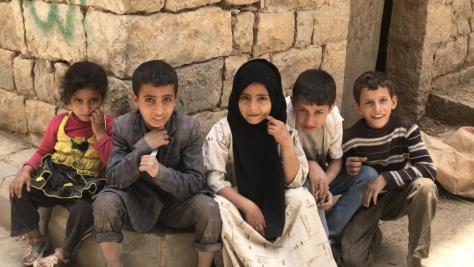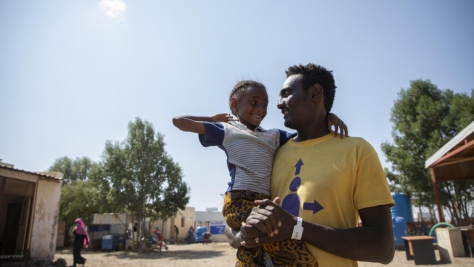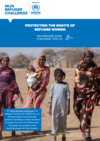Return of 2,400 Somali refugees leads to closing of third camp in Ethiopia
The voluntary return of more than 2,400 Somali refugees last week brings to more than 50,000 the number of voluntary repatriations last year and leads to the closing of a third refugee camp in Ethiopia.

ADDIS ABABA, Ethiopia, Jan. 2 (UNHCR) - The repatriation of thousands of Somali refugees from Ethiopia has continued at a steady pace, reflecting a more stable situation in parts of the east African country and leading to the closing of three of eight refugee camps.
Two convoys last week repatriated 2,412 people from Ethiopia's Daror camp to north-west Somalia, bringing the total number of refugees who returned home in 2001 to 50,216. The latest returnees received a nine-month food ration, plastic sheeting and blankets to help them restart their lives.
The Daror complex, which includes health clinics, schools, water systems and generators, and which once hosted 50,000 refugees, will be handed over by UNHCR to the local community.
Earlier last year, Teferiber and Dawarnaji camps were also closed.
Another estimated 67,000 Somalis who fled following the outbreak of widespread civil war a decade ago remain in five other camps in Ethiopia. More than half are expected to return home by June, but some 30,000 others from southern Somalia cannot be repatriated because the security situation in that part of the country remains unstable.
Related news and stories
Thousands of newly arrived Somali refugees in Ethiopia relocated to new settlement
Samira's Story
Drought brings life-threatening food shortages for refugees in Ethiopia
100,000 new Somali refugees arrive in Ethiopia in the past month, UN and partners are calling for urgent funding
UNHCR teams and partners rush assistance to some 100,000 newly arrived Somali refugees in hard-to-reach area of Ethiopia
As the Horn of Africa drought enters a sixth failed rainy season, UNHCR calls for urgent assistance
-

Discussion Papers 1- 4 UNHCR's Engagement in Humanitarian-Development Cooperation
Dec 2020 Cooperation with development organizations has long been part of UNHCR's approach to building long-term support and finding durable solutions for people forced to flee. Over the past few years, UNHCR's cooperation has both widened and deepened by engaging with global entities like the World Bank, regional entities like the African Development Bank, and development donors. These four papers explore how UNHCR can further cooperate with development actors and strengthen – what we often refer to as – the humanitarian-development nexus. -

Evaluation of UNHCR's Approach to Learning and Development for Workforce and Partners
Dec 2020 This centralised evaluation takes a holistic look at workforce learning and development (L&D) within UNHCR. Making use of desk reviews, mapping of L&D in other agencies, key informant interviews, a staff survey, and numerous validation workshops; the evaluation proposes recommendations at the strategic and practical levels for strengthening UNHCRs approach and delivery of learning and development. Attachments: Annex: ES/2020/11 Management Response and Executive Summary (.zip) -

Nearly 40 million at heightened risk of violence, discrimination and rights abuses as COVID spawns a 'coping crisis'
30 Nov 2020 Study reveals a severe deterioration in international efforts to protect the world's most vulnerable, with human rights violations on the rise. -

'Climate change is the defining crisis of our time and it particularly impacts the displaced'
30 Nov 2020 UNHCR's Special Advisor on Climate Action, Andrew Harper, outlines how global warming is driving displacement, and why decisive action is vital now. -

Mid-Year Trends 2020
30 Nov 2020 -

UN refugee chief appeals for funds to help refugees fleeing Ethiopia's Tigray to Sudan
30 Nov 2020 -

Climate Change / Forced Displacement - a dangerous crossing
30 Nov 2020 -

UNHCR chief calls for support for Sudan as it hosts Ethiopia refugees
29 Nov 2020 Filippo Grandi also launches an appeal for nearly US$150 million to help the government of Sudan look after the refugees. -

Protecting the rights of refugee women
27 Nov 2020
